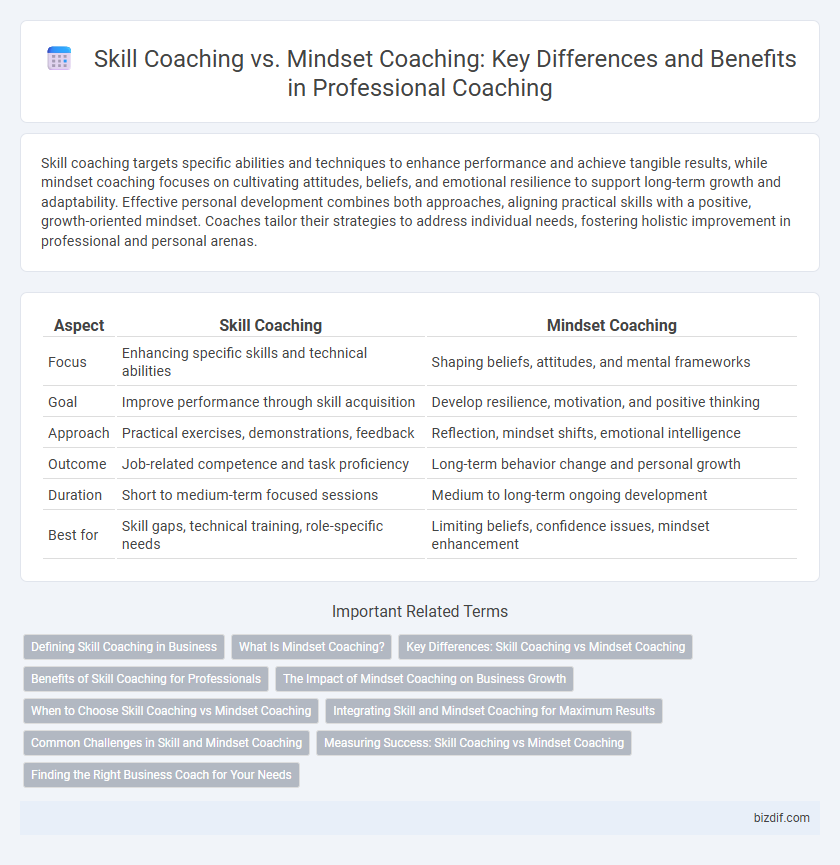Skill coaching targets specific abilities and techniques to enhance performance and achieve tangible results, while mindset coaching focuses on cultivating attitudes, beliefs, and emotional resilience to support long-term growth and adaptability. Effective personal development combines both approaches, aligning practical skills with a positive, growth-oriented mindset. Coaches tailor their strategies to address individual needs, fostering holistic improvement in professional and personal arenas.
Table of Comparison
| Aspect | Skill Coaching | Mindset Coaching |
|---|---|---|
| Focus | Enhancing specific skills and technical abilities | Shaping beliefs, attitudes, and mental frameworks |
| Goal | Improve performance through skill acquisition | Develop resilience, motivation, and positive thinking |
| Approach | Practical exercises, demonstrations, feedback | Reflection, mindset shifts, emotional intelligence |
| Outcome | Job-related competence and task proficiency | Long-term behavior change and personal growth |
| Duration | Short to medium-term focused sessions | Medium to long-term ongoing development |
| Best for | Skill gaps, technical training, role-specific needs | Limiting beliefs, confidence issues, mindset enhancement |
Defining Skill Coaching in Business
Skill coaching in business centers on developing specific competencies and practical abilities essential for job performance and career advancement. It involves targeted training in areas such as communication, technical expertise, leadership, and project management to enhance efficiency and productivity. Skill coaching is measurable, goal-oriented, and designed to equip professionals with tangible tools to meet organizational demands.
What Is Mindset Coaching?
Mindset coaching centers on transforming a client's beliefs, attitudes, and mental frameworks to overcome limiting thoughts and foster growth-oriented behaviors. This approach targets deep-rooted psychological patterns that influence motivation, resilience, and decision-making, enabling sustainable personal and professional development. Unlike skill coaching, which develops specific competencies, mindset coaching reshapes how individuals perceive challenges and opportunities, driving long-term success.
Key Differences: Skill Coaching vs Mindset Coaching
Skill coaching emphasizes the development of specific abilities and practical techniques to enhance performance in targeted areas such as communication, leadership, or technical expertise. Mindset coaching focuses on cultivating attitudes, beliefs, and mental frameworks that influence motivation, resilience, and overall personal growth. The key difference lies in skill coaching addressing "how" to perform tasks efficiently, whereas mindset coaching transforms the underlying psychological approach that drives behavior and decision-making.
Benefits of Skill Coaching for Professionals
Skill coaching accelerates professional growth by enhancing specific competencies such as communication, project management, and technical expertise, leading to immediate performance improvements. This targeted development increases job efficiency and opens pathways for career advancement through measurable skill acquisition. Professionals benefit from skill coaching by gaining practical tools that directly impact their daily work, fostering confidence and adaptability in dynamic business environments.
The Impact of Mindset Coaching on Business Growth
Mindset coaching profoundly influences business growth by fostering resilience, adaptability, and a growth-oriented perspective within leaders and teams. This form of coaching addresses limiting beliefs and promotes psychological flexibility, driving enhanced decision-making and innovative problem-solving. As a result, businesses experience improved performance metrics, increased employee engagement, and sustainable long-term success.
When to Choose Skill Coaching vs Mindset Coaching
Skill coaching is ideal when specific competencies or technical abilities need improvement to achieve measurable outcomes. Mindset coaching becomes crucial when underlying beliefs, attitudes, or emotional blocks hinder personal growth and performance. Choosing between the two depends on whether the challenge is rooted in practical skill gaps or psychological barriers affecting motivation and resilience.
Integrating Skill and Mindset Coaching for Maximum Results
Integrating skill coaching with mindset coaching amplifies personal development by aligning practical abilities with the cognitive frameworks needed for success. Skill coaching focuses on mastering specific competencies, while mindset coaching targets beliefs and attitudes that either limit or enhance growth. Combining both approaches ensures holistic improvement, fostering resilience and adaptability alongside technical expertise for maximum performance outcomes.
Common Challenges in Skill and Mindset Coaching
Skill coaching often faces challenges such as identifying specific competency gaps, designing measurable progressions, and overcoming technical plateaus. Mindset coaching commonly encounters difficulties in shifting limiting beliefs, fostering resilience, and sustaining motivational consistency over time. Both require tailored strategies to address individual barriers and promote effective growth outcomes.
Measuring Success: Skill Coaching vs Mindset Coaching
Measuring success in skill coaching relies on assessing tangible improvements in specific abilities through performance metrics, skill assessments, and goal achievement rates. In contrast, mindset coaching evaluates transformation by tracking shifts in attitudes, resilience, emotional intelligence, and behavioral consistency over time. Both approaches require tailored evaluation frameworks to accurately capture progress relevant to their distinct focuses.
Finding the Right Business Coach for Your Needs
Skill coaching targets specific business competencies such as marketing strategies, sales techniques, and operational efficiency, providing actionable tools for immediate improvement. Mindset coaching addresses underlying beliefs, motivation, and resilience, fostering long-term personal growth and leadership development. Selecting the right business coach requires evaluating your current challenges and goals to determine whether expertise in practical skills or transformational mindset work will drive optimal results.
Skill Coaching vs Mindset Coaching Infographic

 bizdif.com
bizdif.com